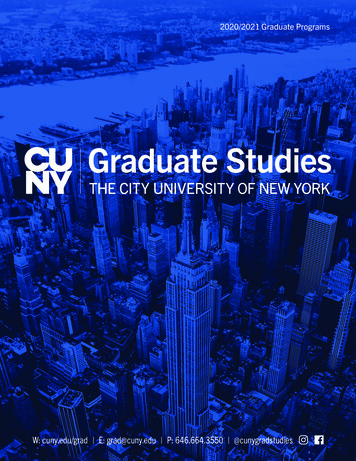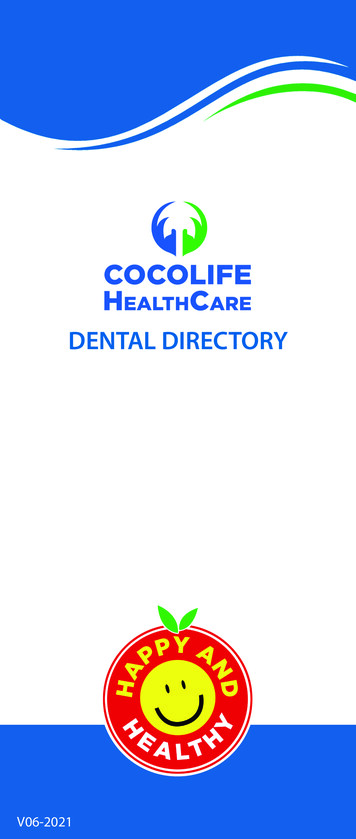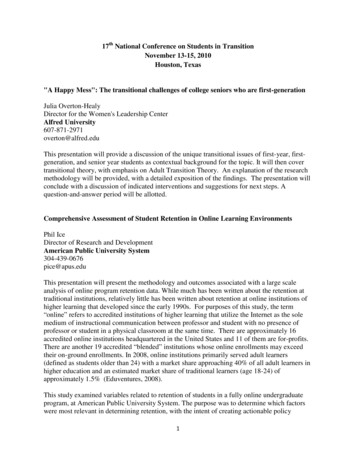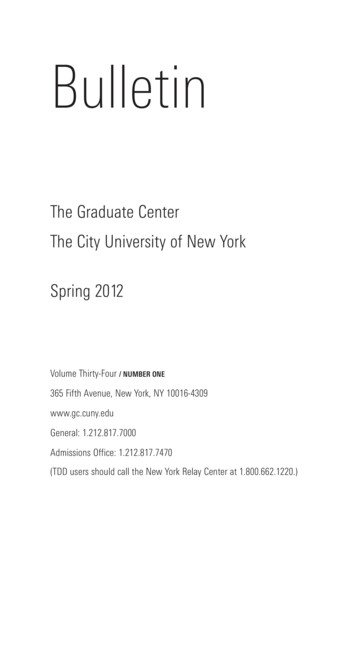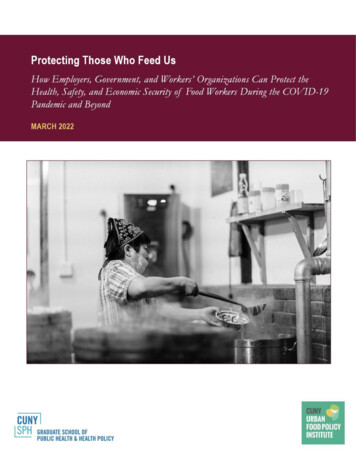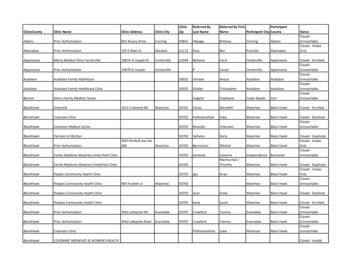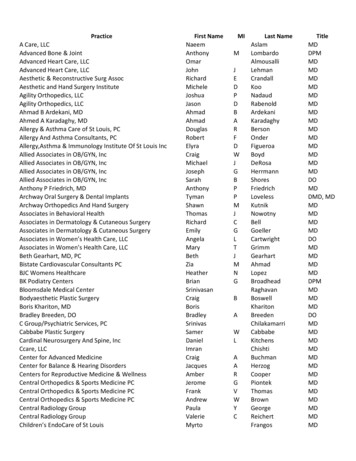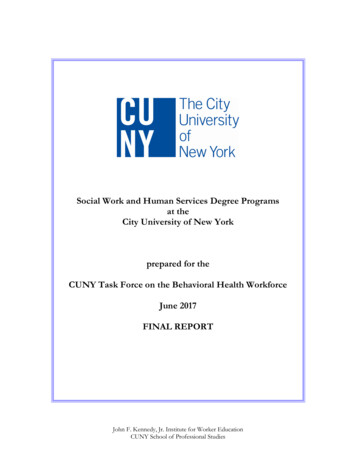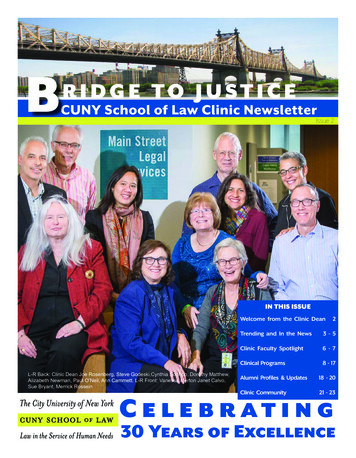
Transcription
BRIDGE TO JUSTICECUNY School of Law Clinic NewsletterIssue 2IN THIS ISSUEWelcome from the Clinic DeanL-R Back: Clinic Dean Joe Rosenberg, Steve Godeski,Cynthia Soohoo, Dorothy Matthew,Alizabeth Newman, Paul O’Neil, Ann Cammett. L-R Front: Vanessa Merton Janet Calvo,Sue Bryant, Merrick Rossein2Trending and In the News3-5Clinic Faculty Spotlight6-7Clinical Programs8 - 17Alumni Profiles & Updates18 - 20Clinic Community21 - 23C e l e b r at i n g30 Years of Excellence
Welcome from the Clinic DeanL-R: Clinic Dean Joe Rosenberg, Support Staff: Dorothy Matthew, V Hill, Ayesha Yasmin, Alexa Pollock, Bernice CohnOn October 24, 2015, as part of alumniweekend, we celebrated 30 yearsof clinical programs at CUNY LawSchool and recognized the foundersof our clinical program: Janet Calvo,Vanessa Merton, Paul O’Neil, SueBryant, Beryl Blaustone, and RickRossein.As a member of the CUNY Lawinaugural class of 1986 and a legalintern in the Health in the WorkplaceClinic, I am filled with mixed emotionsas I reflect back. The sheer passageof time is enough of a humblingexperience, as are memories ofsuccesses and failures, opportunitiesgained and squandered, and theendless struggle for a better worldin the face of overwhelming humansuffering.CUNY Law has been a pioneer inproviding opportunities for studentsto learn by doing under carefullydesigned, student centered pedagogy,2 CUNY Law Bridge to Justicealways with a critical perspective onlaw and the profession.into evening clinics beginning in Fall2017.We have kept our focus on studentsand clients and movements—generations of students have learnedhow to plan, do, and reflect, anddevelop the knowledge, skills, andvalues necessary to be excellentpublic interest lawyers.At the end of May, I am steppingdown as Clinic Dean after four years.I want to thank the clinic facultyand students for their excellentwork. It has been my privilege asClinic Dean to work with the clinicsupport staff: Bernice Cohn, V Hill,Dorothy Matthew, Alexa Pollock,and Ayesha Yasmin. I am gratefulfor their unparalleled dedication andunwavering support.We have understood the importanceof cross-cultural communication,the impact of race, gender, culture,ethnicity, and health, and the horribletoll of racism, poverty, gun violence,and war.We have helped shape our profession—the thousands of students who havegraduated from our clinical programhave distinguished themselves inthe legal profession and beyond.And the work continues with ourcurrent clinic faculty and as we planto welcome our part-time studentsI am delighted that my colleagueDonna Lee will take over as ClinicDean. Donna is a national leader inclinical education and will take usto new heights as she continues todevelop and improve our clinicalprogram.Special thanks to Alexa Pollock andDavid Kene for their work on thisnewsletter.Cover Image: Arpi Pap
CUNY Law Ranked # 3in Clinical Training forSecond Year in a Row“It is gratifying to be recognized as one of the topclinical programs. Our #3 ranking is a tribute to theeffort and commitment of the entire law school community. We deeply value the incredible and meaningful work of our clinic students, faculty and staff.”-Prof. Joe Rosenberg (’86), SeniorAssociate Dean of Clinical Programs.Full Time Day ClinicsAcademic Year 2016 - 2017Fall 2016Community & Economic Development ClinicCriminal Defense ClinicEquality and Justice Practice ClinicFamily Law Practice ClinicHuman Rights & Gender Justice ClinicImmigrant & Non-Citizen Rights ClinicMediation ClinicSpring 2017Economic Justice ProjectHuman Rights & Gender Justice ClinicImmigrant & Non-Citizen Rights ClinicPro Bono Scholars Program(Elder Law and Health Law Placements)* Elder Law Clinic and Health Law PracticeClinic are on hiatus Fall 2016 - Spring 2017Spring 2016 3
PART-TIME EVENINGCLINICS AT CUNY LAWTo Begin Fall 2017CUNY Law School’s evening clinics build on thesuccess and excellence of our full-time clinicalprogram, which is ranked #3 nationally for thesecond year in a row by U.S. News & World cal-training-rankings).Our “in house” Community & EconomicDevelopment Clinic and Human Rights & GenderJustice Clinic, housed at Main Street LegalServices, and our Family Law “practice clinic”,will be offered as hybrids, open to all students inour program, but part-time evening students willget priority registration. All other offerings arelimited to evening students.Our Evening Clinical Programs Will: Give students a clinical experience thatprepares them to be excellent public interestlawyers. Provide students with practical learningopportunities that are tailored to an eveningstudent’s schedule. Offer evening students the same range ofchoices that day students have to the maximumextent possible. Allocate sufficient credits (minimum of 10)so evening students have an immersive lawpractice experience. Increase opportunities for all students byincluding “hybrid” offerings open to both dayand evening students.Fall 2017 Evening Clinics Criminal Defense ClinicFamily Law Practice Clinic (hybrid)Fall 2018 Evening Clinics Community & Economic Development Clinic (hybrid)Criminal Defense ClinicElder Law ClinicHuman Rights & Gender Justice Clinic (hybrid)Aaron Adler4 CUNY Law Bridge to JusticeStudents in CUNY Law School’s Inaugural Part-Time Evening Program
L-R: Clinic Dean Joe Rosenberg, Nate Broughty, Andrew Klaben-Finegold, Court ofAppeals Judge Jenny Rivera, Vincce Chan, Amira Hassan, Angel MelendezPRO BONO SCHOLARS MEET COURTOF APPEALS JUDGE JENNY RIVERAOn March 16, CUNY Law students participating in the Pro Bono Scholars Program,along with Pro Bono Scholars from other law schools, attended a reception that featuredremarks by Court of Appeals Judge (and former CUNY Law Professor) Jenny Rivera.The students in the Pro Bono Scholars Program—Nate Broughty, Vincce Chan,Amira Hassan, Andrew Klaben-Finegold, and Angel Melendez—took the bar examon February 23-24 and began their clinical work on February 29.They will be working as full time interns in a “hybrid” housing clinic with QueensLegal Services. Most of their work will be on Queens Legal Services cases and projectsinvolving housing. The clinic is “hybrid” because they will be supervised by ClinicDean Joe Rosenberg and attorneys from Queens Legal Services.Spring 2016 5
Clinic Faculty SpotlightAfter returning from parental leave in November, ProfessorNermeen Arastu has been keeping busy working with studentsin the Immigration & Deportation Defense and Law & Securitydocket in the Immigrant and Non-Citizen Rights clinic. ProfessorArastu is also supervising students across placements in a varietyof New York’s local immigration advocacy organizations.In Spring 2016, Professor Arastu is also co-teaching an ImmigrationLaw Course with Professor Janet Calvo. Professor Arastu isdeveloping an experiential learning component into the secondyear curriculum by partnering with CUNY Citizenship Now, anorganization that provides free legal services to those on the pathto citizenship. Through this project, students studying doctrinalimmigration law are able to apply what they learn and servecommunities by attending bi-monthly citizenship drives wherethey assist individuals interested in naturalization. We thank CUNYalum Tamara Bloom, Legal Coordinator at Citizenship NOW, for her support in getting this projectoff to a great start!Lisa Davis is the ClinicalOn January 8th, the CUNY Lawcommunity celebrated Prof.Sue Bryant, who was awardedthe Society of American LawTeachers (SALT), Great TeachersAward, along with her colleagueand collaborator, Prof. Jean KohPeters. They were presented withthe award at SALT’s Annual AwardsDinner in recognition of theircontributions to cross culturalteaching and training.6 CUNY Law Bridge to JusticeProfessor of Law for the HumanRights and Gender Justice Clinic.Students in the clinic representclients in the US and abroad onwomen, youth, and LGBT humanrights violations. Currentlyamong its projects, the Clinicrepresents Syrian and Iraqiwomen’s rights organizationswho are working to help thoseescaping ISIS. Recently thestudent legal team traveled toIstanbul to meet with clients andconduct interviews. ProfessorDavis recently published anarticle with the SouthwesternJournal of International Lawentitled, Iraqi Women Confronting ISIL: Protecting Women’sRights in the Context of Conflict, which includes an overview ofthe Clinic’s current work. She is also publishing a book chapterin an academic book on torture with Oxford University Pressentitled, The Gendered Dimensions of Torture: Rape and otherForms of Gender-Based Violence as Torture under InternationalLaw.
Congratulations to Professors Carmen HuertasNoble and Ramzi Kassem on earning tenure and toProfessor Nicole Smith-Futrell on her appointmentas an Associate Professor.Carmen Huertas-Noble is theCUNY Law Professorsh ave p a s s i o n a n dexpertise for publicinterest law that extendsbeyond the classroomsetting. Clinic facultyhave distinguishedthemselves in litigation,scholarship, experientiallearning, advocacy, lawreform and teaching.Ramzi Kassem directs theNicole Smith-Futrell joinedfounding director of the Community andEconomic Development Clinic. ProfessorHuertas-Noble and her students haveplayed a leading role in providingtransactional legal support to workerowned cooperatives in New York City andbeyond. The Community and EconomicDevelopment Clinic has provided legalsupport to a number of leading NYorganizations that create and/or supportworker-owned cooperatives, includingROC-NY, Green Worker Cooperativesand the New York City Network ofWorker Cooperatives. Most recently, theClinic has also worked with PittsburghClean and Green Laundry to create aninnovative, unionized worker-owned cooperative based om principlespioneered by Mondragon University in the Basque Country. The Clinic hasalso formed a partnership with Mondragon’s North American Delegationand 1Worker1Vote to further develop a legal framework and curriculumfor a new hybrid union coop model created by Mondragon InternationalUSA, the United Steelworkers and the Ohio Employee Ownership Center.Immigrant & Non-Citizen RightsClinic. With his students, ProfessorKassem represents prisoners ofvarious nationalities presently orformerly held at American facilitiesat Guantánamo Bay, Cuba, at BagramAir Base, Afghanistan, at so-called“Black Sites,” and at other detentionsites worldwide. In connection withthese cases, Professor Kassem andhis students have appeared as partycounsel and submitted merits briefsbefore U.S. federal district and appellatecourts, before the U.S. Supreme Court,as well as before the military commissions at Guantánamo. ProfessorKassem also supervises the Creating Law Enforcement Accountability& Responsibility (CLEAR) project, which primarily aims to address thelegal needs of Muslim, Arab, South Asian, and other communities in theNew York City area that are particularly affected by national security andcounterterrorism policies and practices.the faculty in 2009 as a ClinicalLaw Professor and SupervisingAttorney in the Criminal DefenseClinic. Professor Smith - Futrelland her students work on criminalcourt cases, state and federalclemency petitions, and otherdefense related proceedings andprojects. In her new position asAssociate Professor. ProfessorSmith-Futrell’s teaching,clinical practice, and scholarshipwill continue to focus on therelationship between socialjustice lawyering and criminallaw and policy reform.Spring 2016 7
CLINICAL PROGRAMSThe Community& EconomicDevelopment Clinic(CEDC) prepares studentattorneystoprovideexcellent legal representationtocommunity-based,organizational clients on a widerange of matters.Currently, the Clinic’s work isdivided into four project areas:the Worker Cooperative LawProject, the Non-Profit LegalSupport Project, the WorkerRights Project and the TenantLaw and Organizing Project.Student-attorneys primarilyfocus on one of the projectareas listed above, but alsohave opportunities to workacross project areas and clinicalprograms when there is studentinterest and/or docket overlap.Student-attorneys in the WorkerCooperative Law and Non-ProfitLegal Support Projects representthese organizations, assistingthem in designing governancestructures, applying for taxexempt status, and complyingwith non-profit, employment,and tax laws. Recently CEDCstudents and alumni helped formthe NYC Worker CooperativeCoalitions, of which the clinicremains an active and essentialmember. CEDC students andalum helped secure 3.3 million( 1.2 million in 2014 and 2.1million in 2015) from the NYCCouncil to fund worker ownedcooperative expansion and createa system to support this growth.In the Tenant Law andOrganizing Project, studentattorneys represent lowincome and marginalizedcommunities against housingevictions and work to bringaffirmative litigation on behalfof tenant associations that arefighting to preserve decent, safeand affordable housing. Lastsemester as part of a housingproject with Queens LegalServices, students representedtenants in a variety of casesincluding NYCHA successionrights, rent overcharge cases,violations of the warranty ofhabitability, and preservation ofrent stabilized apartments.In collaboration with theEconomic Justice Project (EJP),the clinic offers the WorkersRights Project in which studentattorneys represent clients bybringing affirmative litigation infederal court on behalf of groupsthat are fighting to prevent andend wage theft and other forms ofexploitation against vulnerableand marginalized workers. Thismarks the fifth year that thelabor docket is in CEDC and thesecond year that it is offered as across-clinical program with EJP.For further updates, see the EJPsection on page 9.Every CEDC student-attorneyhones key, transferable legalskillsL-R Back: David Muller, Thomas Power, Thomas Popejoy, Trent Santer, Prof. Joe Rosenberg, Visnja Vujica, WestriStalder, Seth York, Andrea Sun-Mee Jones. L-R Front: Marc Vainrib, Hoda Mitwally, Ethan Morley, Prof. CarmenHuertas-Noble, Irene Byhovsky, Alanna Sakovits, Solmaz Mahali, Sofya Janashvili, Jackelyn Mariano ‘(16), andSupport Staff Ayesha Yasmin8 CUNY Law Bridge to Justice
In Fall 2015, the Criminal Defense Clinic (DEF) continued its work onCriminal Court and prisoners’ rights litigation.Students-attorneys represented 15 peoplecharged with misdemeanor crimes in theQueens County Criminal Court. Chargesincluded Assault, Criminal Possession of StolenProperty, Endangering the Welfare of a Child,Criminal Possession of a Weapon, Possessionof Marijuana, and Resisting Arrest.As part of clinic practice, student-attorneyscounsel their clients with myriad mattersrelated to criminal cases (e.g., Family Court;Immigration and Customs EnforcementDetainers; Parole Revocation; employment andlicensing issues). Students also work towardgetting their clients released from solitaryconfinement at Rikers Island and at prisonsacross New York State.Since Spring 2015, the Defenders haveventured into several new areas. At therequest of Administrative Law Judge RayKramer, the Director of the AdministrativeJudicial Institute at the New York City Officeof Administrative Trials and Hearings (OATH),students defended clients against civil forfeitureproceedings brought by the New York City PoliceDepartment. They also entered the nascentclemency movement, representing incarceratedpersons serving life sentences, in their bids forclemency at the federal and state levels fromPresident Obama and Governor Cuomo.The clinical program also includes externalplacements where student attorneys assistsolo practitioners and lawyers in criminaldefense and other civil rights and socialjustice organizations. Past host organizationsinclude Emery, Celli, Brinckerhoff & Abady;Brooklyn Defender Service, Bronx Defenders(Criminal Defense Practice and Civil ActionPractice (Immigration)); the Center for CourtInnovation; the Legal Aid Society (CriminalAppeals Bureau, Criminal Defense Practice, andSpecial Litigation Unit); and Youth Represent.L-R: Bridgette Bissonette (‘10), Prof. Nicole SmithFutrell, Emily Sahli (‘16), Aleka Asamoah (‘16),Somalia Samuel (‘14)“I teach at CUNYLaw because whereelse do you get tobe surrounded by acommunity committedto the cause of socialjustice.”- Prof. Steve Zeidman,Directorof Criminal Defense ClinicProfessors Steve Zeidman and Nicole Smith-FutrellSpring 2016 9
L-R Back: Dorien Ediger-Seto, Annemarie Caruso, Lelia James, Maggie Gribben, Radiyah Adus-Shakur, Christin Fontanella, Prof.Stephen Loffredo, Gregory Tolbert, Ryan MacDonald, Ricky He, Rose Nissen. L-R Front: Julie Gilgoff, Megan Lynch, Prof. BabeHowell, Mayha Ghouri, Katharine Groot, Elizabeth White, Katharine Naples-Mitchell, Robert Jereski (‘17)The EconomicJustice Projectadvocacy spans three distinct, yetrelated fields: college access forindividuals who receive publicassistance; school suspension;and low wage workers’ rights.EJP continues to advance its coremission of expanding access tohigher education as a pathwayout of poverty for low-incomeNew Yorkers. In March 2014,following years of advocacyby EJP and other communityand advocacy organizations,the New York State Legislatureenacted a law (initially draftedby EJP) that, for the first time,allowed welfare recipients tomeet a substantial part of their“workfare” obligations throughstudies in four-year colleges.A significant part of EJP’s recentwork this year has focusedon ensuring full and effectiveimplementation of the new law.In addition to its systemic policywork, EJP continues its legalrepresentation of individualstudents and their families,almost all of whom face dauntingchallenges on the economic10 CUNY Law Bridge to Justicemargins.This spring, EJP expandedits commitment to improvingeducation access by creating theSuspension Advocacy Project.Supervised by Professor BabeHowell, clinic students serveas advocates for those facingsuperintendent’s suspensions atthe K-12 level in the borough ofQueens. In the first two weeks ofthe semester, EJP students anda handful of Defender studentsattended a two-day intensiveintroductory training. By thethird week of the semester theStudent Advocacy Project hadopened its phone and e-mailintake lines, accepted its firsttwo cases, and conducted its firsthearing.Spring 2016 marks the secondyear of a cross-programcollaboration that joins CUNY3Ls in the Advanced Communityand Economic DevelopmentWorker’s Rights Project with 2Lsin EJP who elect Workers Rightsas their project workgroup. Twoongoing federal wage cases,both in the Eastern District ofNew York, occupy the majorityof the project’s time at present.The first case, involving workersat a car wash in Brooklyn, wasreferred by Make the Road NY.In the second case, the Projectundertook representation of 20Nepali gas station workers whohad been organized by Adhikaar,a social justice organizationbased in Woodside and rootedin the Nepali community. Theworkers were subjected to anarray of exploitative and unlawfulpractices.Clinic students spent long hoursover many months meetingwith large groups of theseworkers, gathering informationand developing legal claims.The clinic, together with theLegal Aid Society and law firmKaye Scholer, is now pursuinga plenary action against theowners and managers, allegingmultiple egregious violations ofthe federal Fair Labor StandardsAct and the New York Labor Law.The clinic welcomes Ricky Blum,a staff attorney at the Legal AidSociety Employment Law Unit,who is working with Prof. SteveLoffredo on clinic supervisionin this case.
The Elder Law Clinic (ELC)will be on hiatus for the 2016-2017 academic year. Studentattorneys in the ELC have focused on a variety of topicsrelated to elder law. They’ve practiced in all aspectsArticle 81 Adult Guardianship cases, including servingas court appointed attorneys for individuals allegedto need a guardian, Court Evaluators, representingclients in “restoration” cases who want to dischargea guardian, and also representing clients who need tobecome guardians of a family member or friend. Studentsattorneys have also provided “poverty estate planning”representation to home bound clients, drafted wills,advance directives, and supplemental needs trusts andadvised clients about Medicaid eligibility and preventingthe need for a guardian. ELC interns have developedpaper and digital materials on Article 81 Guardianshipand Alternatives for those who are unrepresented.Elder Law Clinic Victory:Matter of C.L.The Elder Law Clinic (“ELC”) won an importantappeal in the Matter of C.L. C.L. called the clinicin the Fall of 2014, claiming that after she becameill and fell in her NYCHA apartment, she washospitalized for 9 months and, instead of gettingdischarged back to her apartment, the hospitalbrought a guardianship petition.The court appointed a guardian, who relinquishedC.L.’s apartment and placed her in a nursing homeagainst her will. C.L. lost control over her life, lost heraffordable apartment, and lost her independence.The clinic investigated C.L.’s claims and advocatedfor her by filing a motion to discharge her guardianand appealing the original order approving theguardian to the Appellate Division.Clinic students Yi Stewart and Amanda O’Keefe,with the assistance of paralegal Guadalupe Vidal(a graduate of LaGuardia Community Collegeand student at CCNY), under the supervision ofClinic Dean Joe Rosenberg, ParalegalGuadalupe Vidal and Yi Stewart (‘15)Professors Kris Glen and Joe Rosenberg, conductedthe investigation, worked closely with C.L., andprepared the motion papers.Amanda and Yi graduated before the hearingson the motion, and the writing of the appellatebrief, which took place in the summer of 2015.After three days of hearings, the court denied ourmotion to discharge the guardian, although thecourt did appoint a case manager to help C. L. findan apartment in the community.Professor Glen took the lead on the brief to theAppellate Division and argued the motion onJanuary 15, 2016. On February 17, 2016, theAppellate Division issued a decision that reversedthe order appointing the guardian and dismissedthe guardianship petition. This was a victory againstlong odds, but still C. L. languishes in the nursinghome, working with a NYS transition program tofind a suitable apartment in the community. Aspart of the housing work of the Pro Bono ScholarsProgram, we will be advocating with NYCHAand other housing programs to return C.L. to thecommunity.Spring 2016 11
L-R Back: Prof. Rick Rossein, AJ Wipfler, Marc Ramirez, Corey Lederman. L-R Front: Julissa Rodriguez, Alexis Werth,Guillermina Passa Quevedo, Tatyana Segal (‘16)In the Equality and Justice Practice Clinic students work on arange of civil and human rights issues with some of the bestpractitioners and firms in NYCand nationally, for nationallyfocused legal organizations, andfor state and federal agencies.Last semester, Equality studentattorneys Guillermina PassaQuevedo, Sara Abiboutros,and Anthony Rezzonico wereplaced at a preeminent civilrights firm working on highprofile cases involving policeand governmental misconduct,including a class action suitagainst the NYS CorrectionDepartment for systemicviolence against their clients. Theprevious year, student attorneysSue Reyes and Matt Grill (‘15)worked on the landmark Floydv. City of New York case, whichresulted in a finding against theNYPD for racial profiling in theapplication of “stop and frisk”policing policy, primarily incommunities of color.Equality student-attorneys havethe opportunity to work at privatecivil rights firms on a wide rangeof employment discriminationlitigation including sexual andracial harassment, disability,12 CUNY Law Bridge to Justicenational origin, race, and genderdiscrimination. Students haveworked for an alum of theEquality Practice Clinic, ColleenMeenan, who is well known forher trial work in employmentdiscrimination cases and hasa sub-specialty representingLGBTQ workers in both thepublic and private sector.Student attorney RaabiaQuasam did similar work,but from the perspective ofa federal agency responsiblefor enforcement of federalemployment discriminationlaws, the U.S. Equal EmploymentOpportunity Commission(EEOC). Students also worked atthe NYS Attorney General LaborBureau investigating claims ofwage theft on behalf of low-wageworkers. Several CUNY Lawalumni were supervisors of thesestudents, including Bob Rose,who is the Regional Counselof the NY District Office, andMonique Roberts, who servesas the EEOC’s AdministrativeLaw Judge (ALJ) and whosework includes hearing anddeciding claims of employmentdiscrimination by federalemployees.Field placements are alsoavailable at nationally focused,law reform organizations.AJ Wipfler worked for theLambda Legal Defense andEducation Fund’s TransgenderLaw Project on the applicationof the Affordable Care Act’s(ACA) civil rights provision.At LatinoJustice PRLDEF, JeffStrutynski worked on an amicusbrief concerning a Voting Rightscase before the U.S. SupremeCourt. The previous year,Nathalia Verela (‘15) drafted abrief concerning the admissionto the bar of Cesar Vargas (‘11), a“Dreamer” and CUNY alum. (SeeAlumni Updates, p. 20)“I teach at CUNY Law Schoolbecause of the extraordinarystudents and faculty whopursue excellence in theirlawyering, working towardequality and fairness in thelaw and our society.”- Prof. Rick Rossein, Equality and JusticePractice Clinic
Student-attorneysin the Family LawPractice Clinicchoose field placements that buildpractice skills and communityconnections in the areas ofchild welfare and advocacyand assistance to survivorsof domestic violence, payingparticular attention to the uniqueconcerns of immigrants, LGBTQcommunities, and formerlyincarcerated parents and theirchildren.Last semester, Brooke Salvatore,Ruth Chung, and Serena Newellworked for the Juvenile RightsPractice at Legal Aid, representingchildren in abuse and neglectproceedings, while fellow studentsAlexandria Nedd, PlinileidyAbreau, and Matthew Routhserved as defenders for parentsin the child welfare system atBrooklyn Family Defense Practice.A number of students hadplacements in domestic violenceorganizations. In her placementat Manhattan Legal Services, inthe Family Law and DomesticViolence Unit, Jessica Matateyengaged in significant client work,in particular with immigrantclients, where she served as anadvocate on custody, visitation,and child support issues andperformed extensive motionpractice over the course of thesemester. At NYLAG’s DomesticViolence Unit, Maria Youngdrafted Family Offense Petitions,motions, and affidavits associatedwith immigration filings andfocused on trial skills and trialpreparation. She prevailed attrial by obtaining a five-year “stayaway” order for her client.The clinic also had two judicialplacements with family courtjudges, where Angela Shamayand Chelsea Rodriguez performedlegal research, and assisted a courtattorney and judge with caseconferences and with draftingcomplex judicial opinions indomestic violence cases.Radha Desai designed a specialproject, choosing a placement atSanctuary for Family’s TraffickingUnit, where she focused onexploring the intersectionbetween domestic violenceand human trafficking. She didresearch on criminal “vacaturlaw” for sex trafficking victimswho are seeking post-convictionrelief, and drafted trainingmaterials for Vacatur Law CLETrainings of pro-bono attorneys.She edited affidavits for traffickednon-immigrant applicants, andobtained criminal court andimmigration documents on behalfof clients from state court clerksL-R: Prof. Ann Cammett, Jessica Motatey, Maria Young, Alexandria Nedd,Ruth Chung, Angela Shamay, Kristen Zapalac, Brooke Salvatore, KelseyRodriguez, Radha Desai, Matthew Routh, Plinileidy Abreu, Serena Newell (‘16)and the Department of HomelandSecurity.Another student, Kristen Zapalac,worked on a special projectwith the New York City HumanRights Commission, helping toestablish protocols for fieldingcomplaints arising from domesticviolence discrimination. Shealso performed significant workassisting with the implementationof New York City’s Fair Chance Act,which provides new protectionsfor persons with criminalconvictions seeking employment.Along with coordinated fieldplacements, the clinic hosts atwice-weekly intensive seminarwhere students deepen theirunderstanding of robust clientadvocacy and family law systemengagement. Last semester theclass worked on the “FamilyDefense Project.” In this projectstudents collectively research,make presentations, and createadvocacy materials on a variety oftopic areas related to the collateralconsequences of criminalconvictions, such as protectionsfor those seeking employment(e.g. Fair Chance Act materials).The next phase of the projectwill develop a plan to make theseresources widely available.Spring 2016 13
The Health Law Practice Clinic offers placements in a varietyof settings, including local and national organizations thatpromote access to public andmental health services andreproductive rights, as well asgovernment entities working inmatters of medical malpracticeand insurance fraud, and withnational organizations promotingaccess to insurance through theAffordable Care Act. The practiceclinic includes a weekly seminarthat provides student-attorneysthe opportunity to delve deeperinto these issues through classpresentations and practice oflawyering skills.During Fall 2015, studentattorneys specializing in mentalhealth legal issues worked withclients at the Mental HealthProject of Nassau Suffolk LegalServices, the Mental HealthProject of the Urban JusticeCenter, and with MentalHygiene Legal Services. Theyrepresented individuals seekingSSI benefits and contesting theirhospitalization or treatmentregimes, developed empatheticcommunication skills whileworking with clients with mentalhealth concerns, and practicedcross-examining expertsregarding client treatment.Through placements at t
CUNY School of Law Clinic Newsletter. RIDGE TO JUSTICE. Celebrating . 30 Years of Excellence . Trending and In the News 3 - 5 Clinic Faculty Spotlight 6 - 7 . Clinical Programs 8 - 17 Alumni Profiles & Updates 18 - 20. Clinic Community 21 - 23 . 2 CUNY Law Bridge to Justice . clinical education and will take us to new heights as she .
